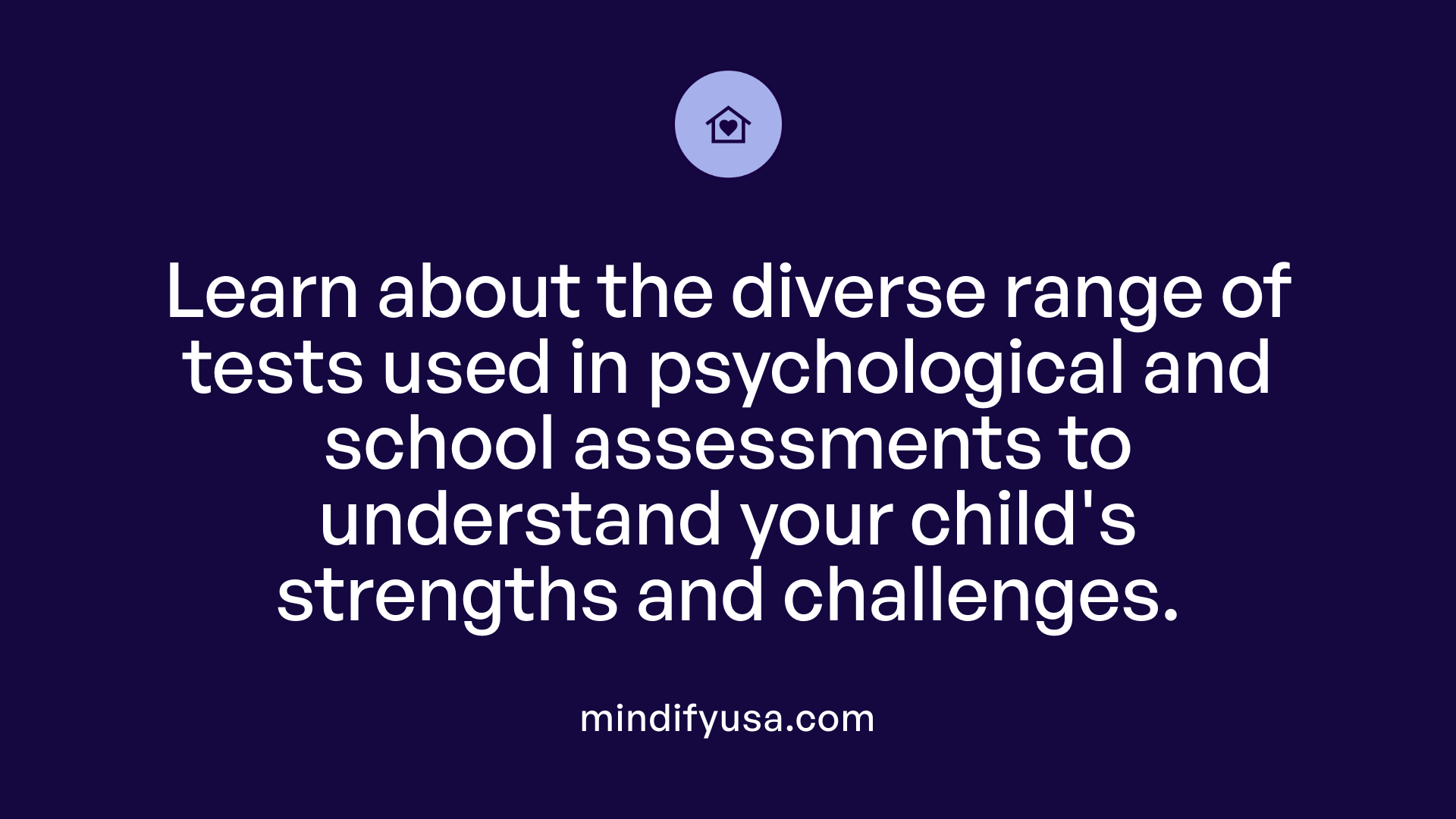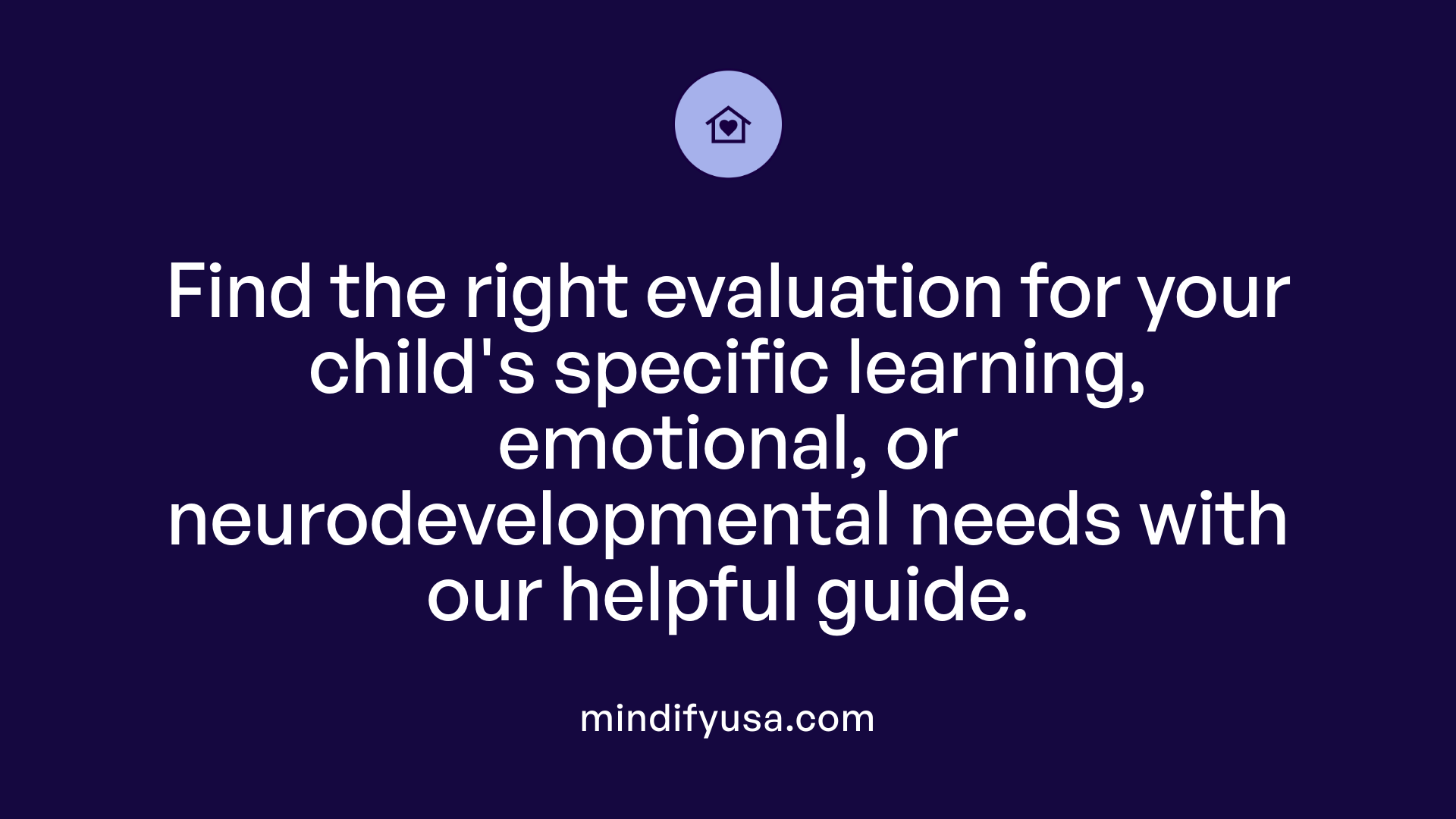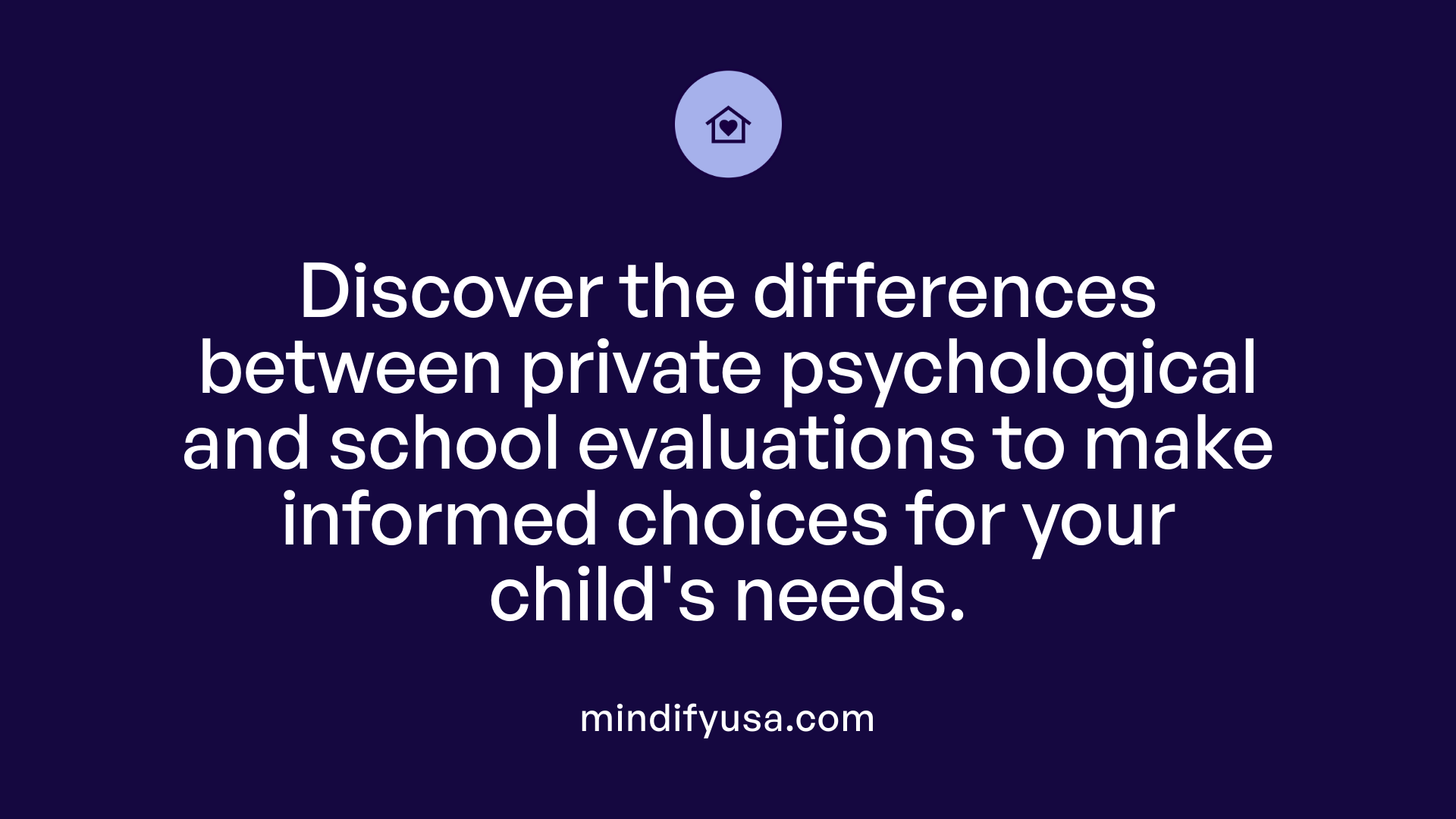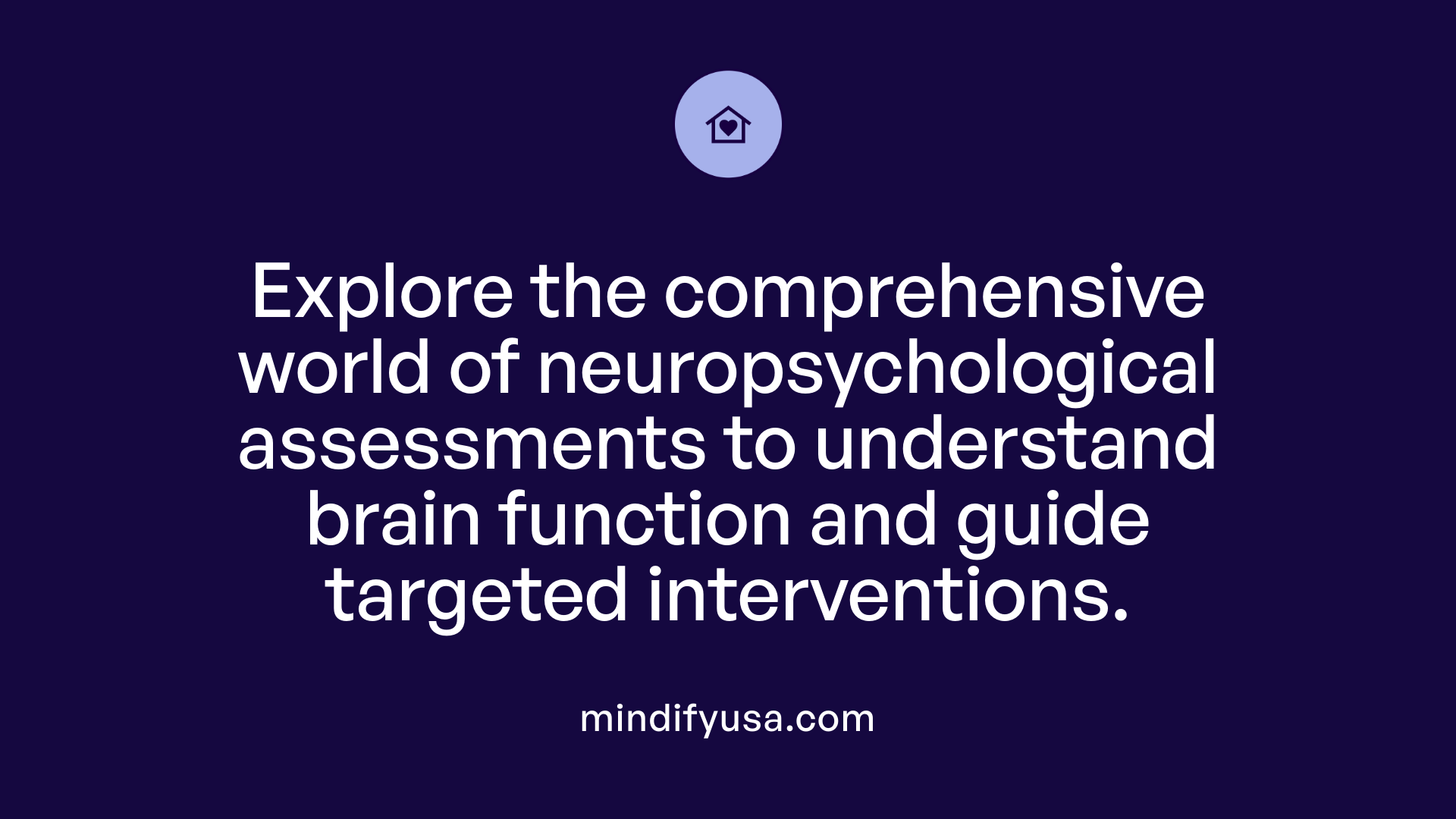Understanding the Distinct Types of Child Assessments
When a child's academic performance or emotional well-being raises concerns, parents and educators face the complex task of choosing the right evaluation method. While psychological assessments and school behavioral evaluations may seem similar, they serve different purposes, involve different processes, and provide different insights. This article explores the key differences, components, appropriate use cases, benefits, and limitations of each to help caregivers make informed decisions tailored to their child's unique needs.
Differentiating Purpose and Scope of Evaluations
What are the differences between psychological assessments and school behavioral evaluations?
Psychological assessments and school behavioral evaluations serve distinct but sometimes overlapping purposes. A psychological assessment is conducted by a licensed psychologist and focuses on understanding an individual's cognitive, emotional, and behavioral functioning. These evaluations aim to provide a thorough psychological profile that can lead to diagnosing conditions such as ADHD, autism spectrum disorder, anxiety, or mood disorders. They include comprehensive procedures like clinical interviews, standardized testing, and detailed interpretation of results. These assessments often offer insights into an individual's mental health and can inform treatment plans, medical interventions, or therapy.
In contrast, school behavioral evaluations are primarily designed to assess a child's behavior, academic performance, and social-emotional functioning within the educational environment. They are typically conducted by school psychologists or behavioral specialists and focus on diagnosing educational or developmental issues that affect learning. The goal is often to determine eligibility for special services, accommodations, or behavioral intervention plans under the Individuals with Disabilities Education Act (IDEA). These evaluations involve behavioral rating scales, observations, and academic assessments but generally do not lead to medical diagnoses.
Cost, timing, and purpose are some of the main differences. Private psychological assessments tend to be more comprehensive and costly, often ranging in the thousands of dollars, and can be scheduled flexibly. They usually involve longer testing sessions over multiple days if necessary. Conversely, school evaluations are usually free, conducted within a set timeframe (often 60 days), and aligned with school policies and schedules.
While both assessments include testing, interviews, and reports, the scope differs significantly. Psychological assessments address broader emotional and mental health issues across various settings, providing diagnostic clarity and treatment guidance. School evaluations concentrate on academic and behavioral performance to determine educational eligibility and support needs.
| Aspect | Psychological Assessment | School Behavioral Evaluation | Focus | Broad emotional, cognitive, and clinical functioning | Academic, behavioral, and social skills within school | Conducted by | Licensed psychologists | School psychologists or specialists | Primary purpose | Diagnosis and treatment planning | Eligibility for educational supports | Cost | Generally more expensive; can be in the thousands | Usually free within public schools | Timing | Flexible scheduling, longer timeframes | Set timeframes, typically around 60 days | Content | Comprehensive testing, diagnostic criteria, treatment recommendations | Observations, rating scales, academic tests | Outcomes | Formal diagnosis, detailed mental health profile | Education-based support eligibility | Usefulness | General mental health, diagnosis, treatment planning | Educational support, behavioral interventions|
In summary, psychological assessments provide a wide-ranging understanding of a person's mental health and are used across clinical, medical, and some educational settings. School behavioral evaluations are focused tools designed specifically to assist in educational planning, often without establishing medical diagnoses. Understanding these differences helps families, educators, and clinicians choose the appropriate evaluation based on the child's needs and the intended outcomes.
Components and Types of Tests in Evaluations

What components and types of tests are involved in psychological assessments and school evaluations?
Psychological assessments are comprehensive processes that use various standardized tests to measure different aspects of an individual's mental health, cognitive functioning, and emotional well-being. These evaluations often include intelligence tests, such as IQ assessments, which provide insights into reasoning, problem-solving, and intellectual ability. In addition, emotional and social functioning is evaluated through questionnaires, interview-based assessments, and sometimes personality tests, which help identify conditions like anxiety, depression, or personality disorders.
School evaluations focus more on academic performance and behavioral patterns. They typically include academic achievement tests that assess skills in reading, writing, and math. Behavioral rating scales, often filled out by teachers and parents, help document behavioral concerns or social-emotional issues. Observations made in the classroom environment are also a common component, providing context to how a child functions in their daily school setting.
These assessments are complemented by background information collection, which involves reviewing previous report cards, standardized test scores, and medical or psychological history. Such records help create a complete picture of the child's learning and behavioral profile.
The tools used in both psychological and school assessments are norm-referenced, meaning they compare an individual's performance to a representative population, and must be valid and reliable to ensure accuracy. Typically, trained professionals such as psychologists, school psychologists, or specialized educators administer and interpret these tests.
All findings are synthesized into detailed reports that combine test results, observations, and background data. These reports outline strengths and weaknesses, diagnose conditions if applicable, and provide recommendations for interventions, accommodations, or further evaluation.
Tests in Psychological Assessments
- IQ and cognitive ability tests
- Achievement tests
- Emotional and personality assessments
- Behavioral rating scales
- Observational checklists
- Developmental and neuropsychological tests
Tests Employed in Psychoeducational Evaluations
- Intelligence quotient (IQ) tests
- Academic achievement assessments (reading, writing, math)
- Cognitive processing tests (memory, processing speed)
- Social/emotional ratings
- Behavioral checklists
- Adaptive behavior scales
Tests Used in School Behavioral Assessments
- Classroom observational checklists
- Behavioral rating scales for teachers and parents
- Functional Behavior Assessments (FBAs)
- Social skills inventories
- Emotional regulation questionnaires
| Test Type | Purpose | Common Tools | Responsible Professionals |
|---|---|---|---|
| Cognitive & Achievement | Measure intelligence and academic skills | WISC, WAIS, Woodcock-Johnson | Psychologists, School Psychologists |
| Behavioral & Emotional | Assess social, emotional, and behavioral functioning | BASC, Conners, CBCL | Psychologists, School Psychologists |
| Observational Checks | Observe behaviors in natural settings | Observation checklists | Teachers, Psychologists |
| Social/Emotional | Understand social skills and emotional regulation | Social Skills Rating System | School Psychologists, Therapists |
This multi-component approach ensures a well-rounded understanding of a child's strengths and challenges, ultimately guiding tailored educational and therapeutic strategies.
Matching Child Needs to the Evaluation Type
 Selecting the right assessment for a child depends greatly on what specific issues or challenges they face. Different types of evaluations are tailored to uncover various aspects of a child's cognitive, emotional, and behavioral functioning.
Selecting the right assessment for a child depends greatly on what specific issues or challenges they face. Different types of evaluations are tailored to uncover various aspects of a child's cognitive, emotional, and behavioral functioning.
Assessments for Learning Disabilities
When a child's academic performance raises concerns—such as difficulty reading, writing, or math—a psychoeducational evaluation is often the most appropriate. This type of assessment examines intelligence (IQ), academic achievement, and processing skills. It helps identify strengths and weaknesses in learning styles, which can guide targeted interventions and accommodations in school settings.
Assessments for Emotional or Behavioral Concerns
For issues related to emotional health, such as anxiety, depression, or behavioral problems like oppositional behaviors or anger management, a psychological evaluation conducted by licensed psychologists provides a comprehensive view. These assessments include clinical interviews, emotional and behavioral questionnaires, and possibly personality testing. They aim to clarify mental health diagnoses and guide clinical treatment or therapy.
Use of Neuropsychological Evaluations
In cases where there is suspicion of brain-based issues, such as after a head injury, or if subtle neurodevelopmental problems are suspected—like in epilepsy or autism spectrum disorders—a neuropsychological evaluation is conducted. This detailed assessment examines multiple cognitive domains, including attention, memory, language, executive functioning, and motor skills.
Neuropsychological testing is especially useful for understanding complex neurobehavioral profiles and planning appropriate interventions that address underlying brain function.
Below is a comparative overview to help clarify the distinctions:
| Evaluation Type | Focus Area | Typical Components | Purpose | Conducted By |
|---|---|---|---|---|
| Psychoeducational | Learning and academic skills | IQ tests, achievement tests, learning style assessments | Identify learning disabilities, guide educational interventions | School psychologists |
| Psychological | Emotional and behavioral health | Clinical interviews, behavioral rating scales, personality tests | Diagnose mental health conditions, guide therapy | Licensed psychologists |
| Neuropsychological | Brain function and cognition | Attention, memory, language, executive function tests | Understand underlying neurocognitive issues, inform treatment | Neuropsychologists |
Choosing the appropriate assessment involves evaluating a child's specific needs and difficulties. Sometimes, a multi-disciplinary approach is warranted, combining various evaluations to gain a comprehensive understanding. For example, a child with both learning challenges and emotional difficulties might benefit from both psychoeducational and psychological assessments.
Ultimately, consulting with educational and health professionals can help determine the most suitable evaluation to support a child's development and well-being. While school-based assessments are free and focus primarily on eligibility for special education, private evaluations often provide more detailed insights and can lead to official diagnoses for medical and mental health conditions.
**More information on evaluation options for child's learning and emotional needs can be found by searching for
Benefits, Limitations, and Choosing the Right Evaluation

What are the benefits and considerations of private psychological assessments versus school evaluations?
Private psychological assessments and school evaluations serve different but sometimes overlapping purposes. Private assessments are usually more detailed and tailored to an individual’s specific needs. Conducted by licensed psychologists, they include comprehensive testing that can lead to formal diagnoses such as ADHD, autism spectrum disorder, mood disorders, or anxiety. These evaluations provide an in-depth look at a child's cognitive, emotional, and behavioral functioning, making them particularly useful for families seeking clarity beyond what school assessments may offer.
One of the main advantages of private evaluations is their flexibility. They can be scheduled at convenient times, often with faster turnaround times for results, which can be helpful in urgent situations or when a detailed diagnosis is needed quickly. They also encompass a broader range of assessments, including neuropsychological, personality, and emotional testing, that can inform targeted interventions, therapy, or medication plans.
However, private assessments come with costs that can be substantial—ranging from a few thousand up to over ten thousand dollars for comprehensive neuropsychological testing. Insurance may not cover these evaluations unless there is a medically diagnosable condition, making affordability a significant consideration. Additionally, scheduling may involve waiting lists, and the process might be intensive, requiring multiple sessions.
On the other hand, school evaluations are generally accessible and free of charge, supported by public school districts under laws like the Individuals with Disabilities Education Act (IDEA). These assessments are typically carried out by school psychologists or other trained educational professionals and focus primarily on academic abilities, intellectual functioning, and developmental progress related to educational needs. They are essential for determining eligibility for special education services and accommodations.
School evaluations follow a structured timeline—usually completed within 60 days from consent—and involve various assessments, interviews, and observations. While comprehensive in assessing basic academic skills, they often do not include the depth of testing necessary for detailed medical diagnoses or neuropsychological profiles. They might not thoroughly evaluate areas like attention, memory, or executive functioning, which can be critical for understanding certain learning or behavioral issues.
The primary purpose of school evaluations is to support eligibility for educational support under state and federal laws, not to diagnose or treat mental health conditions. Therefore, while they are valuable for educational planning, they might not satisfy a family’s need for a formal psychological or medical diagnosis.
In summary, families must consider their goals when choosing an evaluation. Private assessments are ideal for in-depth understanding, formal diagnoses, and tailored recommendations but involve significant costs and planning. School evaluations are more accessible and focus on educational needs and eligibility but may be less detailed for medical or psychological diagnoses.
| Evaluation Type | Conducted By | Main Focus | Cost | Key Limitations | Typical Timing |
|---|---|---|---|---|---|
| Private psychological assessment | Licensed psychologists | Diagnoses, detailed cognitive/behavioral analysis | $2,000–$10,000+ | Costly, insurance not always covered, lengthy process | Few days to several weeks |
| School evaluation | School psychologists / educators | Academic skills, developmental progress, eligibility | Free under IDEA | Less detailed, no formal medical diagnoses | Usually within 60 days |
| Neuropsychological evaluation | Neuropsychologists | Brain-behavior relationships, neurodevelopmental profiling | $4,000–$10,000+ | Extensive, longer duration, costly | Several hours to multiple sessions |
Choosing between private and school evaluations depends on the specific needs and resources of the family. While school evaluations are necessary for educational plans and are accessible, private assessments provide a comprehensive picture that can support medical and mental health diagnoses. Families should consider the purpose of the evaluation, financial factors, and the scope of assessment needed to make an informed decision.
Neuropsychological Evaluations in Depth

What is the scope of neuropsychological assessments?
Neuropsychological evaluations are comprehensive assessments focused on understanding the relationship between brain function and behavior. They are conducted by specialized neuropsychologists who use a variety of standardized tests, activities, and observations to evaluate multiple cognitive domains. These assessments typically include detailed testing of attention, memory, language, executive functioning, visuospatial skills, motor skills, and processing speed.
The aim is to identify subtle brain dysfunctions that might not be evident through general psychological tests. For example, they can detect specific issues related to brain injuries, neurological diseases, or developmental disorders like autism spectrum disorder (ASD) or ADHD. The outcomes help inform diagnosis, guide treatment strategies, and tailor interventions based on an individual's unique neurocognitive profile.
How do neuropsychological evaluations differ from psychological assessments and school evaluations?
Neuropsychological evaluations are distinct from both psychological assessments and school evaluations in several ways.
Scope of Assessment:
- Neuropsychological tests delve deeply into brain-behavior relationships, covering a broad spectrum of cognitive functions including executive function, attention, memory, language, and motor skills.
- Psychological assessments are generally broader concerning emotional, behavioral, and personality issues, often focusing on diagnosing mental health conditions such as depression, anxiety, or mood disorders.
- School evaluations, mainly psychoeducational, concentrate on academic skills like reading, writing, math, and general intelligence, to determine learning disabilities and appropriate educational accommodations.
Purpose of Evaluation:
- Neuropsychological assessments help diagnose neurological or neurodevelopmental issues and clarify the underlying cognitive reasons for learning or behavioral difficulties.
- Psychological assessments are used to understand emotional functioning, mental health diagnosis, and personality traits.
- School evaluations assess academic and cognitive abilities to ensure educational support and compliance with special education laws.
Expertise and Testing Duration:
- Neuropsychological evaluations are often more detailed, involving lengthy testing sessions that can span several hours over multiple days, due to the comprehensive nature of the assessments.
- Psychological assessments are typically shorter, focusing on clinical interviews and targeted testing relevant to emotional and behavioral concerns.
- School assessments are usually less extensive, designed primarily for educational planning and usually completed within a few hours.
Application in Diagnosis and Treatment:
- Neuropsychological assessments are crucial for identifying brain-based conditions and informing neurological or medical treatment plans.
- Psychological tests contribute significantly to diagnosing mental health conditions and guiding psychological or psychiatric treatment.
- School evaluations primarily influence educational planning, accommodations, and support services.
Clinical uses of neuropsychological assessments
Neuropsychological evaluations are vital tools in various clinical scenarios. They are used to:
- Diagnose brain injuries, such as concussions or traumatic brain injuries, and assess their impact
- Evaluate developmental disorders like autism spectrum disorder, learning disabilities, or ADHD
- Detect subtle cognitive impairments that might be caused by neurological conditions such as epilepsy, stroke, or neurodegenerative diseases
- Assist in planning rehabilitation programs and strategies to improve functioning
- Provide detailed cognitive profiles that can influence medication management in conditions like ADHD
- Inform decisions about the need for special education support or accommodations in school settings
By offering a detailed and specific understanding of an individual’s neurocognitive functioning, neuropsychological assessments enable clinicians to formulate targeted interventions that address the root causes of cognitive and behavioral issues.
| Aspect | Neuropsychological Evaluation | Psychological Evaluation | School Evaluation |
|---|---|---|---|
| Focus | Brain-behavior relationship | Emotional, behavioral, personality | Academic skills and abilities |
| Conducted by | Neuropsychologists | Licensed psychologists | School psychologists or specialists |
| Duration | Several hours to multiple days | 1-3 hours | Few hours |
| Main Purpose | Diagnose neurological/neurodevelopmental issues | Clarify mental health and personality | Determine eligibility for educational support |
| Key Areas Assessed | Attention, memory, executive functioning, language, motor skills | Emotional regulation, personality, mental disorders | IQ, academic achievement, learning disabilities |
| Typical Uses | Brain injury, developmental disorders, neurodegenerative disease | Mood disorders, anxiety, behavioral problems | Learning disabilities, accommodations |
This detailed understanding helps ensure appropriate diagnosis and tailored intervention strategies, ultimately improving individual outcomes in both clinical and educational settings.
Choosing the Right Evaluation for Your Child's Future
Selecting the appropriate evaluation type is crucial in understanding and addressing a child's unique needs effectively. While private psychological and neuropsychological assessments provide detailed insights into emotional, cognitive, and neurological functioning—often leading to diagnoses and tailored interventions—school evaluations are essential for access to educational supports, accommodations, and services mandated by law. Parents and caregivers should consult with qualified professionals, consider the child's specific challenges, and weigh factors like scope, purpose, cost, and timing to make informed decisions. Recognizing the differences and appropriate application of each assessment ensures children receive the support they need to thrive academically, socially, and emotionally.
References
- Psychological vs. Psychoeducational Assessments - Humantold
- School Versus Private Psychoeducational Evaluations: Things to ...
- Psycho-educational, Psychological, or Neuropsychological ...
- School District vs Neuropsychological Evaluations: A Guide for ...
- Psychological vs. Psychoeducational vs. Neuropsychological…
- Understanding Psycho-Educational Evaluations
- Descriptions / Types of Evaluation - Pediatric Psychology Associates
- School-Based vs. Clinical Evaluation: What's the Difference?
- Psychological Evaluations | Educational Assessment | San Diego ...
- Psychological Evaluations versus School ... - Hive Child Development






































































































